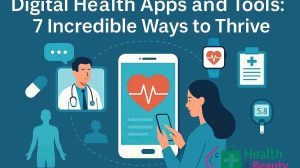The glow of hospital monitors fills the room. Nurses hurry from bed to bed, doctors consult charts, and amid the bustle, something remarkable happens. A quiet algorithm reads thousands of data points—heart rates, oxygen levels, lab reports—and suddenly detects a problem no one has noticed yet. A red alert flashes. Doctors respond instantly. A life is saved before disaster strikes.
This isn’t science fiction. It’s the reality of Artificial Intelligence in Healthcare, transforming the way medicine is practiced across the globe. From spotting diseases earlier to reducing hospital costs, AI medical innovation is reshaping healthcare as we know it.
Here are 9 incredible benefits of Artificial Intelligence in Healthcare that are changing lives every single day.
Incredible Benefits of Artificial Intelligence in Healthcare
1. Early Disease Detection
The earlier a disease is detected, the better the chances of recovery. Artificial Intelligence in Healthcare has revolutionized diagnostics by analyzing medical images, lab results, and genetic data far faster than humans can.
- AI-powered tools can detect breast cancer from mammograms up to 20% earlier than traditional methods.
- Algorithms analyzing retinal scans can predict diabetic complications years before symptoms appear.
This isn’t just about speed. Early detection means less invasive treatments, lower costs, and higher survival rates—a true game-changer for patients and doctors alike.
As health apps evolve, Blood Pressure App for Android demonstrates how digital tools powered by machine learning can predict cardiovascular risks earlier—just like AI in hospitals detects critical conditions before symptoms worsen.
2. Precision and Personalized Medicine
Healthcare is no longer one-size-fits-all. With machine learning healthcare systems, treatments can now be tailored to each patient’s unique biology and lifestyle.
- Genetic profiling combined with AI helps doctors choose the right drug at the right dose for the right patient.
- In cancer therapy, AI models predict how tumors will respond to specific treatments, avoiding unnecessary side effects.
This personalized approach makes medicine more accurate, effective, and safer for everyone.
3. Faster Drug Discovery
Developing new drugs has always been expensive and time-consuming—often taking 10–15 years. But AI medical innovation is accelerating this process dramatically.
- During the COVID-19 pandemic, AI analyzed thousands of drug compounds in weeks, identifying promising candidates in record time.
- Pharmaceutical companies now use predictive modeling to simulate molecular interactions, cutting research costs and timelines.
The result? Life-saving medications reach patients faster, especially for rare diseases and conditions that were previously neglected.
4. Virtual Health Assistants
Imagine waking up at midnight with chest discomfort. Instead of panicking, you consult a virtual health assistant powered by AI.
- It asks about your symptoms, medical history, and lifestyle.
- It recommends whether you should rest, call your doctor, or go to the ER.
Hospitals using AI chatbots have reported 20–30% fewer unnecessary emergency visits, saving time and money while reducing patient anxiety.
5. Predictive Analytics for Hospitals
Hospitals constantly face challenges: bed shortages, staffing needs, equipment demands. Artificial Intelligence in Healthcare helps solve these problems before they even arise.
- Predictive models forecast flu outbreaks, patient admission surges, and ICU capacity needs.
- Administrators can plan resources more efficiently, reducing delays and saving millions in operational costs.
This proactive approach keeps healthcare systems prepared, efficient, and cost-effective.
6. Enhanced Surgical Assistance
Surgeons now have AI-powered tools that provide real-time guidance during complex operations.
- AI analyzes imaging data mid-surgery, helping doctors make precise decisions.
- Robotic surgery systems use AI to improve accuracy and reduce complications.
Patients benefit from shorter surgeries, faster recovery times, and fewer errors—a win for both doctors and patients.
7. Remote Patient Monitoring
With the rise of telemedicine, machine learning healthcare tools enable remote monitoring for patients with chronic conditions.
- Wearables track heart rates, blood sugar levels, and oxygen saturation.
- AI detects abnormal patterns and alerts doctors instantly.
This continuous care prevents emergencies, improves quality of life, and keeps patients healthier at home.
8. Healthcare Cost Reduction
Healthcare costs are rising worldwide. But Artificial Intelligence in Healthcare offers ways to save billions of dollars annually:
- Early detection prevents costly hospitalizations.
- Automation reduces administrative burdens and human errors.
- Predictive analytics avoids unnecessary treatments and tests.
One study estimates AI could save the U.S. healthcare system $150 billion per year by 2026.
9. Improved Patient Experience
At its heart, healthcare is about people. AI medical innovation enhances the patient experience through:
- Faster diagnostic results.
- Personalized treatment plans.
- 24/7 access to virtual assistants for health questions.
Patients feel heard, supported, and cared for—not just treated as numbers in a system.
Final Thoughts
The 9 incredible benefits of Artificial Intelligence in Healthcare show how far we’ve come in merging technology with medicine. From saving lives through early detection to cutting costs and improving patient experiences, AI medical innovation is leading healthcare into a safer, smarter, and more efficient future.
Challenges like data privacy and algorithmic bias remain, but with responsible use and ethical oversight, the potential for machine learning healthcare to transform medicine is limitless.
The future of healthcare isn’t coming—it’s already here, and it’s powered by AI.






